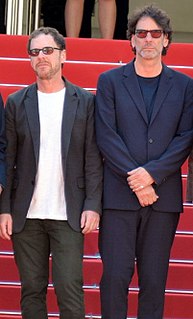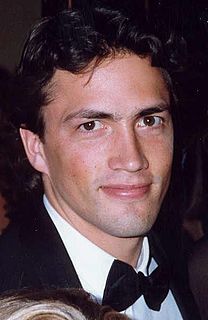A Quote by Joel Coen
Maybe our telling of the story wasn't as clear as it should have been, but I don't think that's true. In terms of understanding the story, it comes across.
Quote Topics
Related Quotes
I think that people have to have a story. When you tell a story, most people are not good storytellers because they think it's about them. You have to make your story, whatever story it is you're telling, their story. So you have to get good at telling a story so they can identify themselves in your story.
I was working within a figurative representational framework, and there was a sense of reading the painting as a transparency, or truth, or autobiography, which I think is partially the burden of artists of color - or women, or anybody who is representing a so-called minority position. Are you actually telling a true story, or your own story? You don't just get to tell a story. The readings of the work didn't necessarily conform to my own understanding of mythology, where violence and eroticism and the body and all of these different forms coexist all the time.
I think that when I'm telling a story, I'm doing the best I can to tell the story as fully as I can, and if there are various fractures that happen in the story, then that's just the very thing that the story is as opposed to my looking for avenues of difference in one story. They just really do exist. For me, anyway.
These short stories are vast structures existing mostly in the subconscious of our cultural history. They will live with the reader long after the words have been translated into ideas and dreams. That's because a good short story crosses the borders of our nations and our prejudices and our beliefs. A good short story asks a question that can't be answered in simple terms. And even if we come up with some understanding, years later, while glancing out of a window, the story still has the potential to return, to alter right there in our mind and change everything.
This is our story to tell. You’d think for all the reading I do, I would have thought about this before, but I haven’t. I’ve never once thought about the interpretative, the story telling aspect of life, of my life. I always felt like I was in a story, yes, but not like I was the author of it, or like I had any say in its telling whatsoever.
There's no quit in our family. Our dad was the chief proponent of that. [On the set] we were constantly telling each other, Stay true to the story, we know that we love each other, keep communication open. We knew how unique this was-you're doing a movie that really could be put out there all over the world, and you're telling this personal story about your family.
The Prodigal Son story is, I think, the greatest short-story ever written. It has such drama in it, such great characters, it's so clear and concise, and it's entertaining in the sense that everyone can relate to it. But you have no doubt what our Lord was trying to communicate in the heart of that story. So the truth was not sacrificed on the altar of entertainment in that case. And it can be.






































